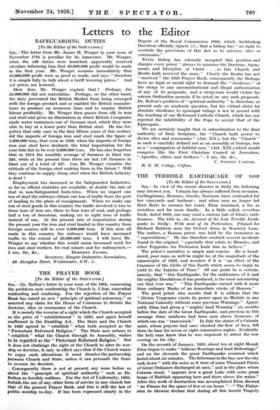Letters to the Editor
SAFEGUARDING DUTIES
[To the Editor of the SPECTATOR.]
Sin,—The letter from Mr. James H. Weager in your issue of November 17th is peculiar for its innocence. Mr. Weager, when the silk duties were launched, apparently received circulars informing him that 16,000,000 profit would be made in the first year. Mr. Weager assumes immediately that £6,000,000 profit were as good as made, and says "therefore it is simple folly to talk about a tariff lowering prices." And yet prices are lowered.
How does Mr. Weager explain that ? Perhaps the .0,000,000 did not materialize. • Perhaps, on the other hand, the duty prevented the British Market from being swamped with the foreign product- and so enabled the British manufac- turer to produce on economic lines and to employ British labour profitably. Mr. Weager then passes from silk to iron and steel and gives an illustration in which British Companies made water containers out of German steel, which they were able to buy at a lower price than British steel. He has for- gotten that only once in the first fifteen years of this century did the imports of foreign iron and steel reach the figure of 2,000,000 tons, that even in 1928, when the imports of foreign iron and steel have declined, the total importation for the year bids fair to be over 3,000,000 tons. He has also forgotten that-in 1913 the monthly average of furnaces in blast was 388, while at the present time there are but 147 furnaces in blast out of a total of 427. Can Mr. Weager visualize the attitude of the foreign steel making firms in the future ? Will they continue to supply cheap steel when the British industry is dead ?
• Employment has increased in the Safeguarded Industries, so far as official statistics are available, at double the rate of that in non-Safeguarded Industries. When we import one ton of steel the railways obtain one ton of traffic from the port of landing to the place of consignment. When we make one ton of steel goods in this country the traffic involved is two to three tons of iron ore, three to four tons of coal, and perhaps half a ton of limestone, making six to eight tons of traffic instead of one. At the present rate of importation during the present year the iron and steel landed in this country from foreign sources will be over 3,000,000 tons. If this were all made in this country the railways would have increased traffic -to the extent of 20,000,000 tons. I will leave Mr.
-Weager to say whether this would mean increased work for iron and steel workers for coal miners and for railwaymen.- 1 am, Sir, &e., DOROTHY JACOBS, Secretary, Empire Industries Association.
• 26 Abingdon Street, Westminster, S.W. 1.


















































 Previous page
Previous page